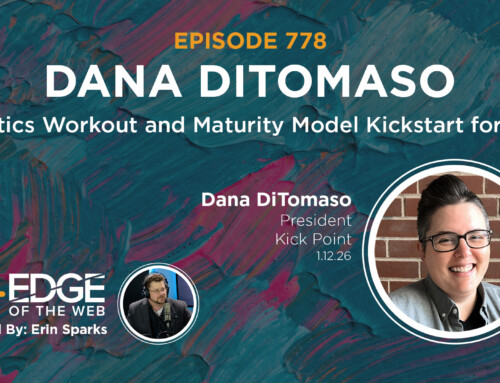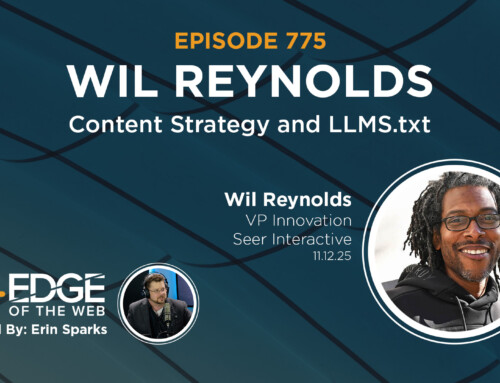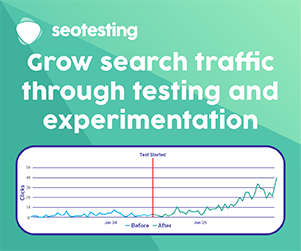News from the EDGE: Week of February 22, 2021
Two stories this week are about what’s happening with Google Search Console, and a third is about an SEO smackdown between Wix and WordPress (Mordy says those are fightin’ words!). Host Erin Sparks and Studio Creative Director Jacob Mann along with Mordy Oberstein, Wix’s SEO Liaison, analyze and comment on these headlines in this week’s news roundup, episode 396 of the award-winning EDGE of the Web podcast!
[00:03:22]
GMB Messaging for Desktop Now Rolling Out
From Roger Montti on Search Engine Journal we see Wix vs WordPress? Mueller Says Solve Content Issues. Someone tweeted their intention to build a Wix site to test how well it ranks for local search compared to WordPress. John Mueller responded with a series of helpful suggestions, emphasizing that platforms that take care of the technical are ideal for small business owners. Without a complete understanding of how Google ranks a site, the conclusions reached are limited by the amount of understanding the person interpreting the results has.
- Erin Sparks: Mueller noted that tests are tricky because you have to put in the same level of effort in on both platforms. This is especially true around content. You can bean-count your way to a great technical SEO score and be error-free but still have subpar content that hurts your ranking.
- Mordy Oberstein: Technical SEO is very important, but what makes your site valuable to users isn’t technical SEO, it’s the content. You have to have great content, and Google wants you to give great content to users that brings them value. That should always be the number-one priority. Stop obsessing over structured data and instead focus on content.
- Erin Sparks: Right. Forget about specific keywords and specific pages and create valuable content for customers.
- Mordy Oberstein: So there’s this persistent myth out there that you can only get your website to rank well if it’s on WordPress, as opposed to another closed CMS platform like Wix. This is a myth! There are plenty of Wix websites that rank very well and get huge amounts of traffic. I don’t know where this myth comes from, but it’s been around for years. And the problem with smaller businesses is that they’re focused on doing business, so they don’t have time to make sure they’ve got great content. Their problem probably isn’t primarily technical SEO, it’s the quality of their content.
- Erin Sparks: WordPress was just the first CMS to really get out in front with various SEO plugins and things to help with SEO, even though most don’t do anything all that difficult. And it’s just been an echo-chamber ever since that perpetuates this myth. But those plugins don’t actually help you do the most important part, which is writing great content. Knowing your audience and what content they want and need is real work, and it has nothing to do with technical SEO.
- Mordy Oberstein: I think what John’s really getting at has to do with search marketing equity. You shouldn’t have to be a giant business with endless resources to be able to rank. You should be able to produce quality content and maybe have a little help from an SEO consultant and get the job done.
- Erin Sparks: And among Mueller’s tips are “avoid plugins” and use a “simple and reliable platform” for hosting and managing your site. It doesn’t have to be WordPress!
- Mordy Oberstein: Or look at GMB. Google wants businesses to really use it to do business and pitches it as adding value to their business but then when they get it into they find out it’s not going to do that unless it’s properly optimized so now the business has to spend money on getting an SEO to optimize it. If Google wants GMB to be all it can be, there has to be some search marketing equity where these local companies don’t feel like they have to spend a lot of money on SEO.
[00:16:47]
Google Search Console Changes Core Web Vitals Reporting
Also on Search Engine Journal but his time from Matt Southern, we learn that Google Search Console Changes Core Web Vitals Reporting. Google Search Console is changing how Core Web Vitals are measured and reported on, which is likely to be a positive thing for site owners. Going forward, the metrics defining the boundaries for largest contentful paint (LCP), first input delay (FID), and cumulative layout shift (CLS) are now defined as <= (less than or equal to). Previously the boundaries for each of the Core Web Vitals was defined as < (less than). That meant the Google Search Console report would only show a “good” rating if measurements were under the ideal thresholds. Site owners can now achieve a “good” rating if measurements meet the ideal thresholds.
- Erin Sparks: The article drills down in to what those ideal thresholds are for a number of vitals, and it’s worth mentioning that you should be paying attention to these because they do affect your SEO and rankings.
- Mordy Oberstein: It’s a little bit sad that people are excited about this very slight change to the score reporting to add in the “equal to” so that those who were slightly on the wrong side of the equation now aren’t. And I do agree that these are important because of how they can affect rankings. All other things equal between two competing sites, these vitals could tip the scale in favor of one over the other. My big question is, how do you “fix” LCP? This one’s the challenge because it’s the SEO’s responsibility to check and flag it for fixing, but the actual fix means convincing the client and their marketing team to get rid of heavy items like the giant hero image, and the fixes have to be taken care of by web development. All I can say is, “Good luck.”
- Erin Sparks: Yes, if you need to really bring down the LCP, you have to get web dev involved, and you’ll have to look at plugins, which can slow things up. And then with FID, how many things have to run and load before the page becomes interactive, or with CLS how much popping up and shifting about happens on the page? Fixing these things for SEO purposes is not easy, especially if your marketing and salespeople are convinced some of those heavy elements and pop-ups are essential to conversions.
- Mordy Oberstein: I’m really curious to see how this plays out because a lot of businesses and sites simply won’t be able to fix these web vitals because it’s too much work and too expensive.
- Jacob Mann: If you haven’t seen it, there’s a tweet out there about how the Google web page that explains Core Web Vitals does not itself pass the Core Web Vitals test.
- Erin Sparks: Physician heal thyself, right?
- Mordy Oberstein: Content.
[00:25:59]
New Google Search Console “Associations”
From Barry Schwartz on Search Engine Land: New Google Search Console “Associations.” Google announced a new feature in Search Console named “associations.” Associations lets you connect your Search Console account with other Google accounts, such as YouTube, Google Analytics, Android apps and much more.
- Erin Sparks: There’s a lot you can connect to your GSC through associations. I guess the question is, what’s the purpose?
- Mordy Oberstein: So Google can say they offer omni-channel marketing. Buzzword alert! About one minute before signing on for today’s news roundup and did connect my Google Analytics to my Google Search Console. So far I don’t notice anything different. I also don’t feel any different.
- Erin Sparks: It’s not as if these different parts of Google don’t know about each other already, right?
- Mordy Oberstein: Exactly. But it makes sense. It would be nice if someone could get this right so you have one place to look and understand your performance across the entire web. Because this, of course, is only for your performance across the Google web.
This week on SEO chat will be Garrett Sussman, Head of Marketing at Traject, to chat about Google My Business Posts. Join what is always a lively weekly chat on Twitter by tuning in to #SEOchat on Thursday at 1:00 pm eastern time to get in on the conversation.



 –>
–>


















